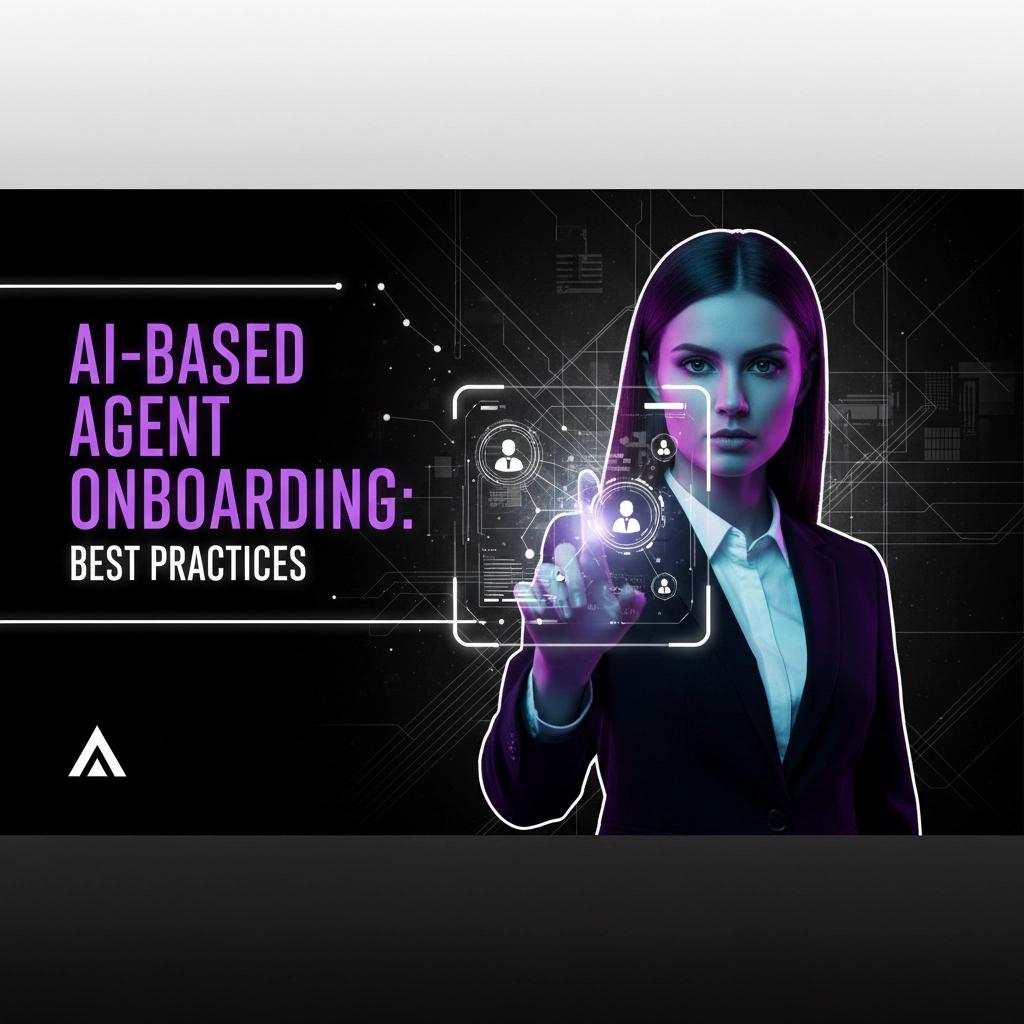Real estate brokerages face a critical challenge. New agent onboarding determines whether recruits become top performers or leave within their first year. Traditional onboarding methods: paper forms, scattered training materials, inconsistent mentorship: create friction that costs both time and talent.
AI-based agent onboarding changes this equation. Smart systems automate routine tasks, personalize learning paths, and provide consistent support that scales across any brokerage size. The result: faster time-to-productivity, higher retention rates, and agents who start generating revenue sooner.
Core Principles of AI Agent Onboarding
Task-Specific Agent Selection
Different onboarding phases require different AI capabilities. Document processing agents handle license verification and compliance forms. Communication agents send timely reminders and schedule training sessions. Analytics agents track progress and identify bottlenecks.
Match agent capabilities to specific functions rather than deploying generic solutions. This targeted approach ensures each AI system operates at peak efficiency within its designated role.
Data Integration and Access
AI agents require comprehensive data access to function effectively. Connect systems to CRM platforms, MLS databases, training management systems, and compliance tracking tools. This integration enables agents to understand individual contexts and deliver personalized onboarding experiences.
Without proper data integration, AI agents become expensive chatbots rather than intelligent assistants that drive real business outcomes.

Governance and Compliance Framework
Real estate operates under strict regulatory requirements. AI agents must enforce policy logic that prevents shortcuts around essential compliance steps. Block system access until license verification completes. Require mandatory training completion before lead assignment.
Define clear boundaries between automated processes and human oversight. Critical decisions about commission structures, territory assignments, or disciplinary actions remain under human control.
Implementation Best Practices
Strategic Objective Setting
Establish measurable goals before deployment. Reduce onboarding time from 30 days to 15 days. Achieve 95% completion rates for mandatory training modules. Improve new agent satisfaction scores by 40%.
Clear metrics enable teams to track progress and optimize systems based on actual performance data rather than assumptions.
Personalized Learning Paths
Ingest agent metadata including experience level, specialty focus, geographic market, and learning preferences. New agents receive foundational training while experienced agents transferring from other brokerages skip basic modules and focus on company-specific processes.
Luxury market specialists access high-end marketing materials while first-time buyer specialists receive different resource sets. This personalization increases engagement and reduces irrelevant training time.
Cross-Departmental Coordination
Onboarding touches multiple departments: HR manages contracts, IT provisions technology, marketing provides materials, and sales managers assign territories. Host planning workshops that map workflows and identify integration points.
When departments understand how AI agents will interact with their processes, resistance decreases and adoption accelerates.

Real Estate Specific Applications
License and Compliance Management
AI agents verify license status across multiple states, track continuing education requirements, and send renewal reminders. Systems flag compliance gaps before they become regulatory issues.
Automated compliance tracking reduces administrative burden while ensuring brokerages maintain good standing with regulatory bodies.
Technology Provisioning
New agents require access to CRM systems, lead generation tools, marketing platforms, and mobile applications. AI agents automatically provision accounts based on role and geographic assignment.
Integration with PWRU’s comprehensive platform streamlines this process by providing unified access to essential real estate tools through a single onboarding flow.
Market Education and Territory Assignment
AI agents analyze local market data to create customized territory briefings. New agents receive neighborhood statistics, recent sales data, and competitive landscape analysis specific to their assigned areas.
This data-driven approach helps agents understand their markets faster and begin productive prospecting sooner.
Mentorship Coordination
Match new agents with experienced mentors based on specialty areas, personality assessments, and geographic proximity. AI systems schedule regular check-ins and track mentorship effectiveness through performance metrics.
Automated mentorship coordination ensures no new agent falls through the cracks while optimizing mentor-mentee pairings for maximum success.

Technology Integration Strategies
CRM and Lead Management
Connect onboarding systems with existing CRM platforms to automatically assign lead sources and establish follow-up protocols. New agents receive pre-configured pipelines that match their experience level and territory characteristics.
Pulse Intelligence integration provides real-time market insights that help new agents understand opportunity patterns and timing in their assigned territories.
Communication Automation
Deploy multi-channel communication strategies that reach agents through email, text, and mobile push notifications. Vary communication frequency based on onboarding progress and engagement levels.
Avoid overwhelming new agents with information while ensuring critical updates reach them through preferred channels.
Performance Tracking
Implement comprehensive analytics that track onboarding milestone completion, time-to-first-transaction, and early performance indicators. Identify patterns that predict long-term success or early departure risk.
Use this data to continuously refine onboarding processes and intervention strategies.
Measuring Success and Optimization
Key Performance Indicators
Track quantitative metrics including onboarding completion time, training module engagement rates, first-transaction timeline, and 90-day retention rates. Compare these metrics against historical baselines to measure improvement.
Monitor qualitative feedback through surveys and focus groups to understand agent experience beyond numerical data.
Continuous Improvement
AI agent onboarding systems improve through continuous learning. Analyze successful onboarding patterns to identify best practices. Modify workflows based on feedback and performance data.
Regular system updates ensure onboarding processes evolve with changing market conditions and regulatory requirements.
ROI Analysis
Calculate return on investment through reduced administrative time, improved retention rates, and faster agent productivity. Factor in technology costs against savings from reduced manual processes and improved outcomes.
Most brokerages see positive ROI within six months of implementing comprehensive AI-based onboarding systems.
Future-Proofing Your Onboarding Strategy
AI technology continues advancing rapidly. Build onboarding systems with flexible architectures that accommodate new capabilities and integration requirements.
Stay current with regulatory changes that affect real estate practice. Ensure AI agents adapt to new compliance requirements without manual reprogramming.
Partner with technology providers who understand real estate specific needs rather than generic business software vendors. Schedule a demo to explore how specialized real estate AI platforms can transform your onboarding processes.
The brokerages that implement AI-based onboarding today will have significant competitive advantages in agent recruitment and retention tomorrow. Start with pilot programs that prove value before scaling across entire organizations.





